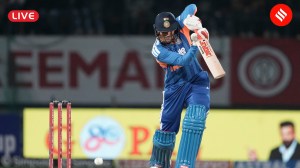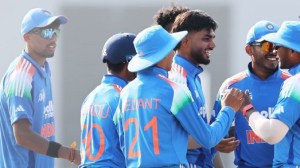A tale of two protests: In Karnataka, port projects set off fears over fishing, livelihood
On the morning of February 24, hundreds of fishermen from the hamlet gathered at Keni beach, protesting against a geo-technical survey for the proposed port.
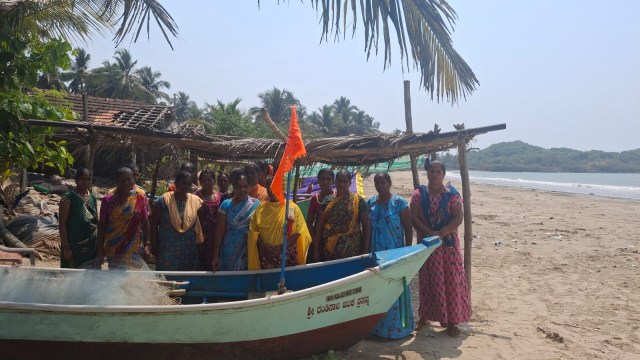 Women were among the protesters at Keni beach, in Karnataka’s Ankola, earlier this month. (Express photo by Pavneet Singh Chadha)
Women were among the protesters at Keni beach, in Karnataka’s Ankola, earlier this month. (Express photo by Pavneet Singh Chadha)For the past 17 years, Nilesh Harikantra (30), a fisherman in Keni-Bavikeri village in Karnataka’s Uttara Kannada district, has had the same morning routine. At 4 am, he and his crew push their 20-foot doni — a colloquial term for a small boat — into the shallow waters of Keni beach and launch the fishing nets.
After a few hours, they return with the day’s catch — mostly sardines, mackerels and prawns — which is cured, dried and sold by women in the family at the local market. But when he reached the beach earlier this month, a posse of policemen who had been camping there threatened to seize his boat.
It was in November 2023 that the commercial port company, JSW Infrastructure Ltd, won the bid to develop a port at Keni on a public-private partnership basis. At the time, the company said in a statement that the proposed port is “envisaged as an all-weather, greenfield, multi-cargo, direct berthing, deep-water commercial port for handling all types of the cargoes on the west coast in North Karnataka region to serve the industries in the area covering Bellary, Hosapete, Hubballi, Kalaburagi and South Maharashtra”.
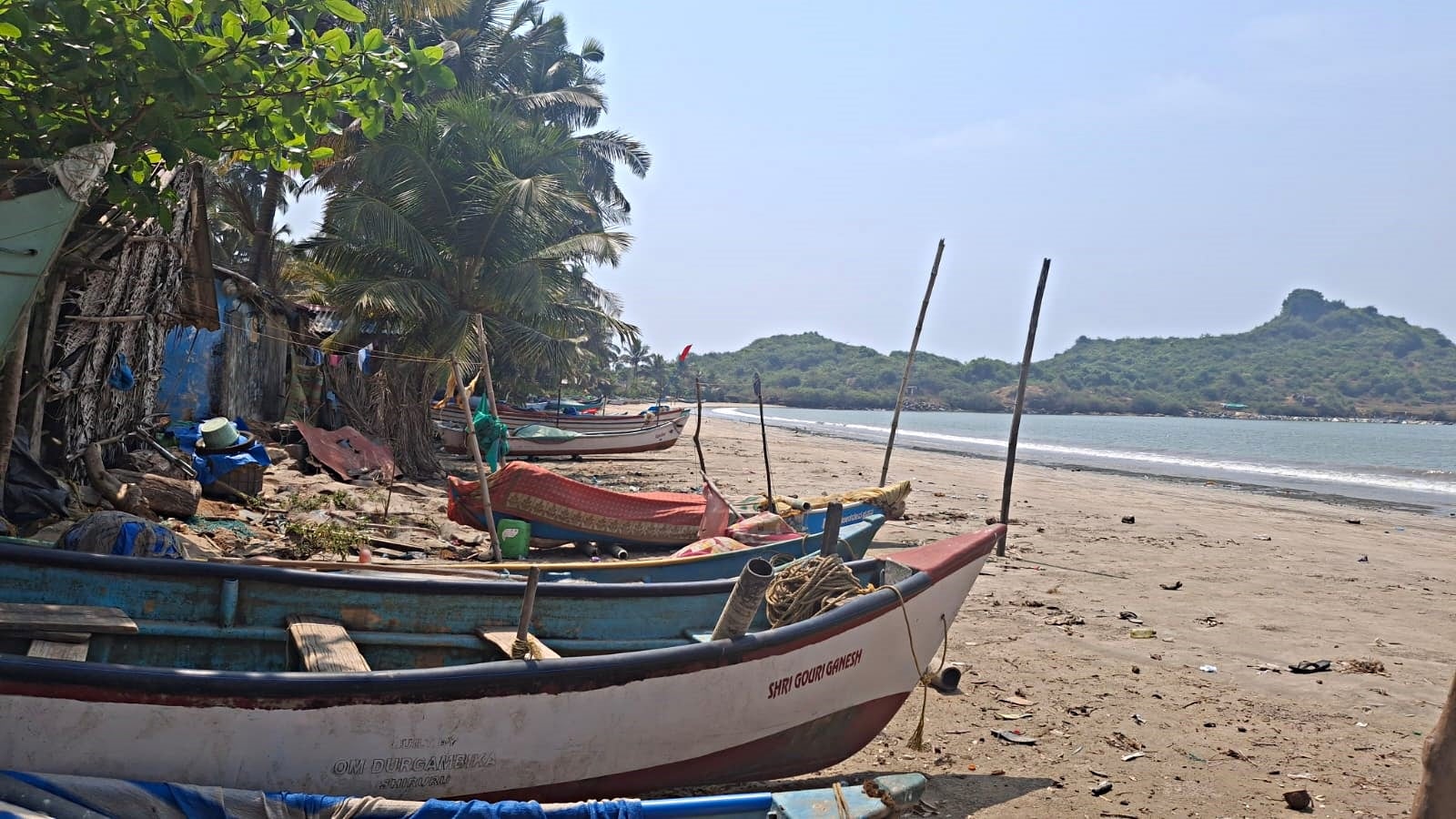 Keni Beach, located in the Uttara Kannada district of Karnataka. (Express Photo)
Keni Beach, located in the Uttara Kannada district of Karnataka. (Express Photo)
“The proposed Keni port would have modern environment-friendly mechanised facilities for handling cape-size vessels,” it said. The estimated cost is Rs 4,119 crore, with an initial capacity of 30 million tonnes per annum.
On the morning of February 24, hundreds of fishermen from the hamlet gathered at Keni beach, protesting against a geo-technical survey for the proposed port.
Apprehending protests, the district administration had imposed prohibitory orders for 24 hours in the village. Some fishermen, and women, jumped into the sea and threatened to die by suicide if the port project was not scrapped. Two were hospitalised.
Since then, more than 20 policemen have been stationed on the beach — sitting on plastic chairs, keeping a watch. Fishing in the village, which has a population of 2,882 fisherfolk, came to a halt for a few days after the protest. Though it has resumed near the shore, fishermen remain worried about their livelihood. According to the Marine Fisheries Census 2016, almost all the 725 families in Bavikeri are traditional fishermen, and 710 are below the poverty line.
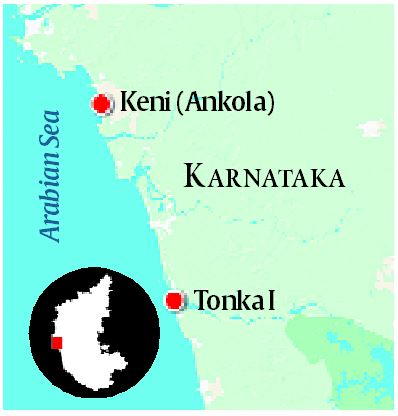
The firm did not respond to an email seeking comment.
Girija Soma Harikantra (51) was among those who jumped into the sea at the protest and was hospitalised for two days. “There is no food on our plate without fishing. We don’t have any property but for the sea. We are scared the police will seize our boats,” she said. Keni remains their only fishing ground since nearly 30 km of coastline in the region remains “off-limits” for traditional fishermen at neighbouring ports in Belekeri and Karwar, fishermen said.
V N Nayak, a retired professor of marine biology from Karnataka University, said traditional fishermen will be impacted since they operate in in-shore waters. “There will be a lot of dredging. Reclamation means that the area is lost in the ocean. The revival of biodiversity will take at least 15-20 years. A huge breakwater will be constructed, so it will impact the current pattern. When the floor is disturbed, there is turbidity. What is used as reclaimed soil… the coastal sediment – it is nutrient for the fish, but for companies, it is waste. The shallow water fishing will be gone from that area,” he said.
Vikas Tandel, an executive member of the National Fish Worker Forum, Karnataka, said, “The reclamation of land through dredging near the shore causes significant disruption to ecosystems, resulting in a loss of biodiversity and marine habitats.”
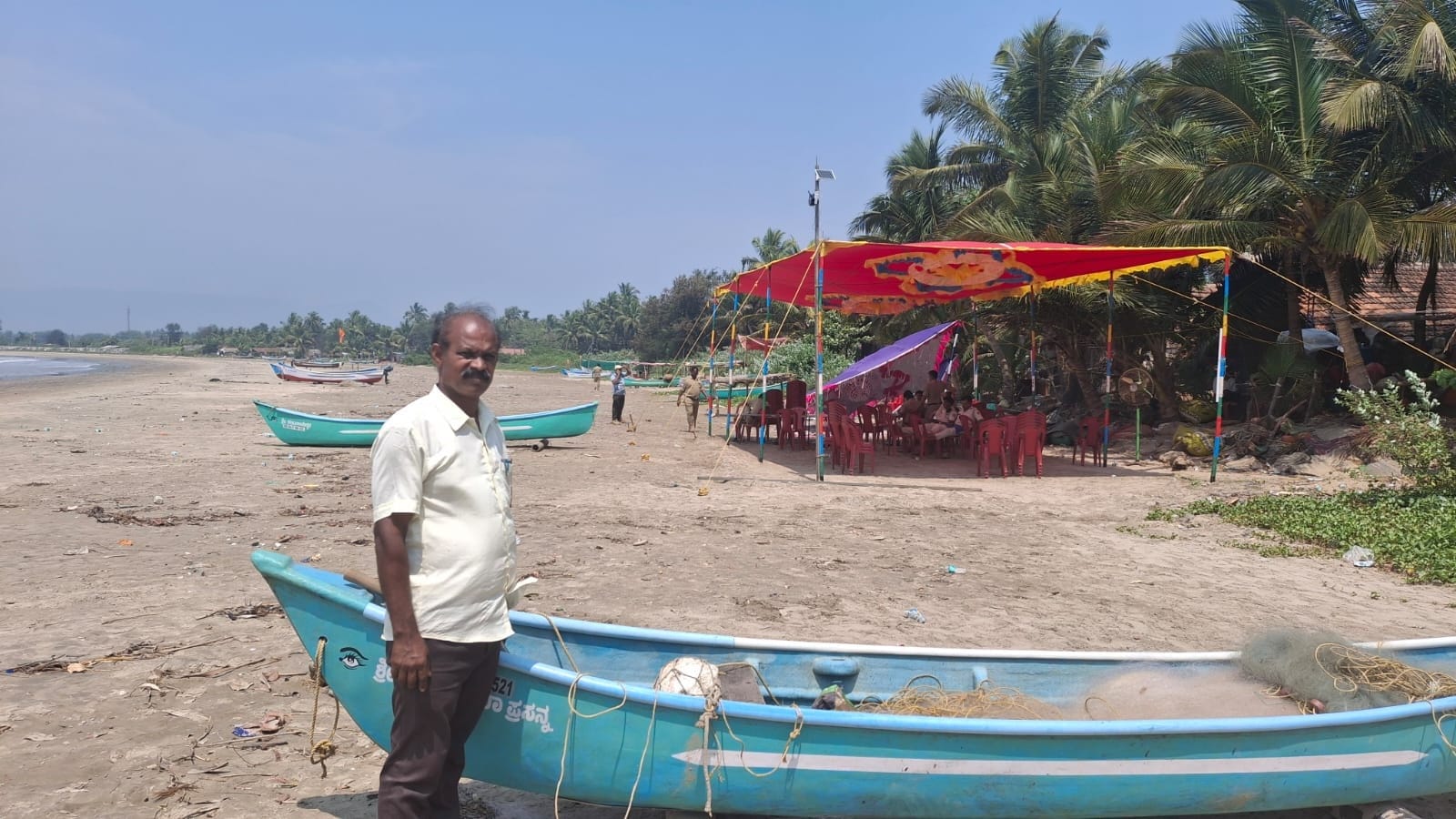 The fisherfolk argue that the port will adversely impact the estuary, fish breeding grounds, and biodiversity of the eco-sensitive area and upend their lives. (Express Photo)
The fisherfolk argue that the port will adversely impact the estuary, fish breeding grounds, and biodiversity of the eco-sensitive area and upend their lives. (Express Photo)
Uttara Kannada deputy commissioner Lakshmi Priya said the district administration and police have held meetings with fishermen. “The survey work has started, and there are prohibitory orders in certain areas where (feasibility) study is being conducted,” she said, adding that fishing is allowed, but not in the area where the feasibility study is ongoing.
65 kilometres away
Like in Keni, tension prevails in the fishing hamlet of Tonka 1 in Kasarkod village of Honnavar taluka. On the morning of February 25, dozens of police personnel marched to the village and arrested 24 fishermen for allegedly obstructing road survey work for a proposed port.
Some fishermen and women tried jumping into the sea to protest. Police invoked sections of attempt-to-murder, rioting, and criminal conspiracy in the FIR. Villagers allege the police “dragged” people from their homes and assaulted them with canes. Since then, some fishermen named in the FIR have gone into hiding.
In Honnavar, fishing and allied activities are the main occupation and source of livelihood. The Marine Fisheries Census 2016 estimates that more than 15,000 fisherfolk reside in the taluka. For over a decade, the community has been opposing the development of a port by Honnavar Port Private Limited (HPPL), a subsidiary of Hyderabad-based infrastructure company GVPR Engineers Ltd.
The fisherfolk argue that the port will adversely impact the estuary, fish breeding grounds, and biodiversity of the eco-sensitive area and upend their lives. The infrastructure for the port will also shrink coastal space for the dry fishing business, which employs several women. Roja Tandel, a fisherwoman, said she purchases fish from the harbour and sells it at the local market after cleaning and drying it for three days. “We do not know agriculture. We are not literate. The men in our families go out to sea, and women sell dried fish,” she said.
The barge/vessel loading facility — meant to handle a capacity of 4.9 million tonnes per annum of cargo of coal, iron ore and general cargo (granite, fertiliser, molasses, sugar) at the coastal sand pit of Kasarkod Tonka village — is being developed as a public-private partnership between the port department of Karnataka government and the HPPL.
The proposed port is located on the confluence point of river Sharavathi and the Arabian Sea. The environmental clearance was granted in 2012 and expired in September 2024. The State Environmental Impact Assessment Authority in December 2024 issued a fresh environmental clearance for the project.
Prakash N Mesta, a marine biologist from Honnavar, said the beach where the proposed road and port area are located is a turtle nesting site for Olive Ridley turtles. “If a port comes up, their habitat will be destroyed. It will change the whole topography of the river mouth,” he said.
“The entire fishing community will be at risk of being displaced since fish will stop breeding here. The road will be used to transport coal and iron ore, which will cause pollution,” he said.
Villagers said they had a meeting on February 11 with local authorities and police, where they were informed that the port construction work would commence soon and that they must cooperate. Raju Tandel, a fisherman, said a verbal order was announced on February 24 evening through loudspeakers in the village, which said prohibitory orders would be in force the next morning. “We were all marching on the beach to protest when the police arrived in large numbers,” he said.
“Three years ago, the authorities imposed a curfew and sent police when we protested against the construction of a port-linked road along the beach. In 2021, they demolished a shed to make way for the access road. We are facing several FIRs,” said Tandel.
“This is a fight for our existence,” he said.
The ownership of land in the village, which comes under the port limits, remains disputed due to accretion, sea erosion and shifting of the Sharavati river mouth over the years. While villagers claim it is private land and they were granted land ‘pattas’ decades ago, the authorities say the fisherfolk have encroached on port land.
Narayana M, Superintendent of Police, Uttara Kannada, said 24 persons were arrested. On the high-handedness and deploying armed forces to curtail the protests, Narayana said, “About 20 police personnel were assaulted by the protesters…We had information from district intelligence which made us deploy additional force.” He said the district administration and police held several meetings with fishermen “to help them understand the importance of the port, which can generate thousands of jobs.”
He said that several WhatsApp groups were created, where some miscreants spread false messages about the project.
Raghavendra Reddy, executive director of HPPL, said they have been executing work based on government and court orders. “We should allow for development and see what is best to protect (the environment). With the port, a lot of jobs will be created and the economy of the area will grow and benefit the community. We have received all the requisite approvals and the environmental clearance for the project.”
“Fishermen claim it is their ancestors’ land, but in court proceedings, they have not been able to produce evidence for their claims,” he said.
- 01
- 02
- 03
- 04
- 05














